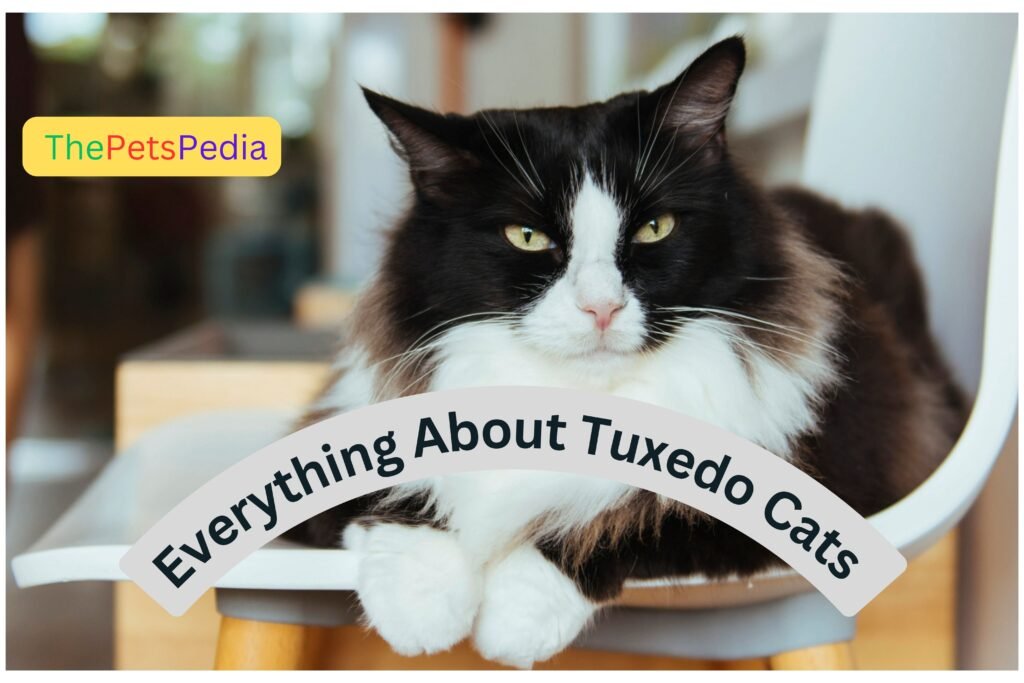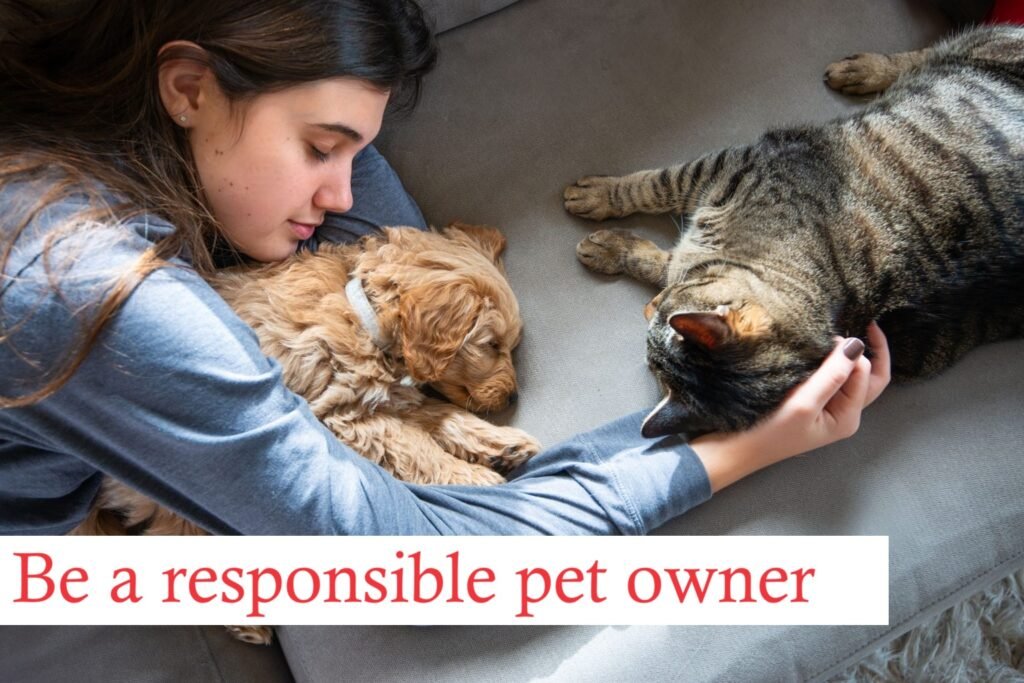Tuxedo cats are loved for their unique black-and-white coats, which resemble formal tuxedos. This stylish look, combined with their playful and affectionate nature, has made them a popular choice for cat lovers worldwide.
This article will explore the fascinating history, unique physical characteristics, playful temperament, and best care practices for these charming cats.
Tuxedo Cat Quick Facts
| Characteristic | Details |
| Size & Weight | Medium to large, generally 8–18 pounds |
| Coat Type | Sleek, soft, and dense; can be short or medium-length |
| Coat Colors | Predominantly black with white on the chest, paws, and face |
| Eye Color | Green, gold, or blue |
| Temperament | Playful, social, intelligent, and affectionate |
| Body Structure | Muscular, with an athletic build (varies by breed) |
| Health Concerns | Prone to obesity, dental issues, and genetic conditions |
| Life Expectancy | 12-20 years with proper care |
A Brief History of Tuxedo Cats
Though their exact origin isn’t clear, tuxedo cats have a rich history that traces back thousands of years. It’s believed that cats with the black-and-white tuxedo pattern were present in ancient Egypt, where they were cherished and even immortalized in art and artefacts. Due to their unique patterns, some say that tuxedo cats were seen as mystical beings and kept as guardians in ancient households.
The tuxedo pattern occurs due to a combination of genetic factors that control fur color and spotting. Over time, they have grown popular in culture, famously represented by characters like Felix the Cat and Sylvester from Looney Tunes. These characters mirror the lively, intelligent personalities that real-life tuxedo cats often display.
Physical Traits of Tuxedo Cats
Since tuxedo cats can belong to various breeds, their physical traits vary. However, certain features make them easily recognizable.
Coat and Color
The classic tuxedo pattern includes a primarily black coat with white markings on the chest, paws, and sometimes the face. This contrast gives them the look of a little “suit” and even, in some cases, what appears to be a “bow tie” or “spats.” Each tuxedo cat has unique markings, making them distinct from each other.
Size and Weight
Tuxedo cats can vary in size based on their breed. Most are medium to large and weigh between 8 and 18 pounds. Larger breeds like the Maine Coon can weigh even more, while smaller breeds like the Devon Rex are typically lighter.
Eye Color
Tuxedo cats’ eyes come in various colors, including shades of green, gold, or blue. Their vibrant eyes stand out against their black-and-white coats, giving them an even more striking appearance.
Tuxedo Cat Temperament and Behavior
The personality of a tuxedo cat is often described as playful, intelligent, and affectionate. However, since they can belong to many different breeds, individual temperaments may vary.
Playful and Full of Energy
One thing many tuxedo cats share is a playful streak. They enjoy toys, games, and interactive play with their owners. Toys like feather wands, laser pointers, and balls that they can chase are perfect for them. Their energy level makes them great companions for families and cat lovers who enjoy spending active time with their pets.
“Tuxedo cats are known for bringing playful energy and a hint of mystery into any home.” — Catsluvus.com
Intelligent and Social
Tuxedo cats are known for their intelligence and are quick learners. Many owners find that their pet Tuxedo cats can learn tricks, follow commands, and even respond to their names. They are also highly social and enjoy the company of people and other pets. With early socialization, they tend to be outgoing and adapt well to different environments.
Affectionate and Loyal
Tuxedo cats are often described as affectionate and loyal. They enjoy cuddling with their owners and being involved in family activities. Many tuxedos will happily curl up on their owner’s lap, making them excellent lap cats. They often form strong bonds with their families, making them wonderful companions.
“Owning a tuxedo cat is like having a friend who brings charm, warmth, and loyalty every day.” — Ana Monnar
Top 5 Nicknames for Tuxedo Cats and Their Origins
- Tuxies – A popular term among cat lovers, used affectionately for tuxedo-patterned cats.
- Penguin Cats – Inspired by their black-and-white resemblance to penguins, common on social media.
- Felix Cats – Named after Felix the Cat, a classic cartoon character.
- Moo Cats – A playful name for tuxedo cats with cow-like markings.
- Suit Cats – Emphasizes their “formal” tuxedo look, like a little suit.
Caring for a Tuxedo Cat: Tips and Recommendations
Owning a tuxedo cat comes with the joy of caring for their needs. Here are essential tips to ensure they stay healthy and happy.
Grooming Tips
Most tuxedo cats have low-maintenance coats, but regular grooming helps keep their fur in top condition.
- Brushing: Brush your tuxedo cat once a week to reduce shedding. Long-haired tuxedo cats may need more frequent brushing to prevent matting.
- Nail Trimming: Trim your cat’s nails every two to three weeks to prevent them from growing too long.
- Ear Cleaning: Check their ears regularly for wax buildup. Clean with a vet-recommended solution as needed.
Diet and Nutrition
A balanced diet is essential for a tuxedo cat’s health.
- Protein-Rich Diet: Cats are obligate carnivores, so a diet rich in protein supports their energy and muscle needs.
- Wet and Dry Food: Wet food helps with hydration, while dry food can support dental health. Consult your veterinarian to choose the best food for your cat’s health needs.
- Fresh Water: Always provide clean, fresh water for your cat to drink.
Exercise and Enrichment
Tuxedo cats need both physical and mental stimulation to stay happy and healthy.
- Toys and Puzzles: Engage them with toys that encourage their hunting instincts, like feather wands or puzzle feeders.
- Climbing Spaces: These cats enjoy climbing and exploring high spaces, so cat trees or shelves are great additions to your home.
- Daily Playtime: Spend time each day playing with your tuxedo cat to build a strong bond and keep them mentally sharp.
Health Considerations for Tuxedo Cats
Tuxedo cats can be generally healthy, but they may face some common health issues, depending on their breed.
- Heart Disease
Some tuxedo cats may be at risk of genetic heart conditions, like hypertrophic cardiomyopathy (HCM). Regular veterinary check-ups can help detect and manage this condition.
- Obesity and Diabetes
Tuxedo cats can be prone to weight gain, especially if they are indoor-only cats. A balanced diet and regular exercise help prevent obesity and reduce the risk of diabetes.
- Feline Immunodeficiency Virus (FIV) and Feline Leukemia Virus (FeLV)
These viruses are serious and often affect outdoor cats more frequently. Keeping your tuxedo cat indoors reduces the risk of contracting these diseases.
- Kidney Disease and Hyperthyroidism
Older tuxedo cats may be at risk of kidney disease and hyperthyroidism. Regular veterinary check-ups and early screenings can help detect these conditions in their early stages.
Lifespan and Quality of Life
With proper care, tuxedo cats can live fulfilling lives, often reaching up to 20 years. Their quality of life depends on a balanced diet, regular exercise, mental stimulation, and consistent veterinary care.
“A tuxedo cat is not just a companion; they’re a loyal friend wrapped in elegance.”
Socialization and Training
Early socialization can help your tuxedo cat grow into a confident, well-adjusted adult. Exposing them to different people, pets, and environments early on can reduce stress and make them friendlier as they age.
- Litter Training: Tuxedo cats are quick learners, and most can be easily litter-trained.
- Positive Reinforcement: Use treats and praise to encourage good behaviour and teach them simple commands and tricks.
Living Environment for Tuxedo Cats
Tuxedo cats adapt well to various living environments, but they thrive in spaces with plenty of play and exploration opportunities.
- Safety Precautions: Ensure your home is cat-safe, with secure windows and balconies.
- Compatibility with Pets: Tuxedo cats usually get along with other pets. Gradual introductions can help them form positive relationships with new animals in the household.
Where to Find a Tuxedo Cat
If you’re eager to bring a tuxedo cat into your life, here are a few ways to find your new feline friend.
Adoption
Many shelters have tuxedo-patterned cats available for adoption. Adoption fees typically range between $50 and $150, often covering initial vaccinations and spaying or neutering. Adopting gives a cat in need a loving home and is an affordable option.
Reputable Breeders
If you’re interested in a specific breed that features the tuxedo pattern, reputable breeders are another option. Prices can vary from $500 to over $2,000 depending on breed and lineage. Be sure to choose breeders who prioritize ethical practices.
Final Thoughts
Tuxedo cats are delightful companions known for their good looks and charming personalities. With proper care and attention, a tuxedo cat can become a loyal, playful friend who brings joy to your home for many years. Whether you’re drawn to their distinctive appearance or their friendly nature, a tuxedo cat is sure to steal your heart.
Everything You Need to Know About Abyssinian Cats



